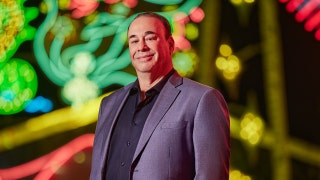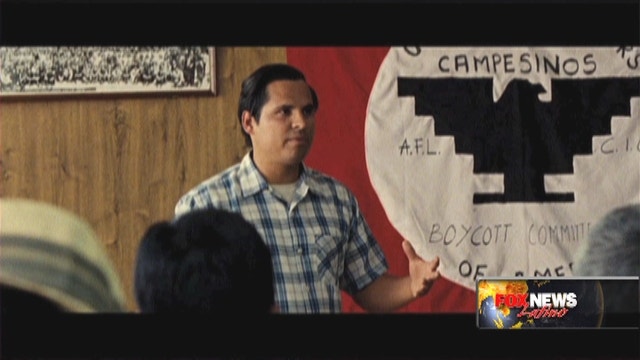'Cesar Chavez' Biopic Is More Than Just About Mexican Farm Workers, It's About Social Justice
Diego Luna, Michael Peña and America Ferrera discuss the legacy of Cesar Chavez and what their new biopic means to the struggle.
“Cesar Chavez,” the biopic about the late Hispanic union leader that fought for fair wages for farm workers, has been gaining buzz leading up to its theatrical release on Friday.
The movie won the audience award at the trendy South by Southwest Festival in Austin this month. President Obama recently hosted a screening at the White House. There have been Facebook campaigns urging Latino moviegoers to go see the movie, and it received support from the National Hispanic Christian Leadership Conference, which has more than 60 million members.
There have been many documentaries about Cesar Chavez, who co-founded the United Farm Workers in 1962, led a grape boycott and organized a 300-mile march in California from Delano to Sacramento. But it wasn't until now that Chavez' story finally became a bona fide Hollywood movie.
It was a passion project for Diego Luna, who directed and produced the film.
"This is a story of a Mexican-American, a guy who was born here, a hero of this country, a man who brought change to America, a beautiful story that everyone should hear," said Luna during an interview with Fox News Latino.
Luna is best known for starring in films such as "Milk" and "Y Tu Mamá También," but for "Cesar Chavez" he decided to leave acting aside and focus on directing and producing, his first time sitting in the director's chair in an English-language project.
"It's a story that belongs to this country and it was important to get it right."
Although the story of the legendary civil rights activist Cesar Chavez is studied in many colleges, and there are many streets and even schools in densely Hispanic areas named after him, he is a part of American history that never truly picked up mainstream recognition and his legacy hasn’t crept its way into pop culture.
Luna set out to change that.
"We don't see films about the Latino experience with all the complexities and the cultural diversity and richness that our community has, and it's time for that to happen," he said.
Luna's motivation to shine a brighter light on Chavez's legacy were his own children.
"When [my son] was born I thought he was born Mexican-American, he belongs to a community today, a community that is not celebrated in cinema."
The biopic tells the story of how Cesar Chavez rose from national director of the Community Service Organization to world-renowned pacifist. We not only see him as the leader who fought incessantly to get fair wages for farmworkers, but also as a man stretching himself beyond the limits and struggling to be a good husband and father while leading an American social movement.
Luna, who produced the movie through his company Canana Films, said there were many filmmakers chasing the story but the Chavez family settled on theirs.
Mexican-American actor Michael Peña gives life to Cesar Chavez in the movie. This is the first lead role for Peña, who otherwise has a vast career in Hollywood with roles in Oscar-nominated films such as "American Hustle" and "End of Watch."
"It means a lot because my parents were farmers, and they came in to have the American dream," said Peña to Fox News Latino. They worked hard, they know of Cesar Chavez but like me they didn't know his story," he added.
He told Fox New Latino that giving life to such an iconic figure was intimidating, but an honor.
“You want to entertain people but you want to be truthful to who he was,” he says, “I’m glad I was able to do it.”
The movie spotlights another hero often forgotten from that era, Helen Chavez, the dedicated wife who helped the movement while raising their eight children.
Actress America Ferrera, known for her role in "Ugly Betty" and "Real Women Have Curves,” plays the multitasking mother, unrelenting union organizer and caring wife.
"She was willing to get arrested, she ran the credit union when Cesar went back to the fields to organize, she went back to work in the fields to make money to feed her children," Ferrera told Fox News Latino.
The actress, whose parents immigrated to the United States from Honduras, told us that Cesar Chavez' legacy is not just relevant for Chicanos because it was a movement for social justice that crossed language, race and color.
"He included the Filipino farmworkers, he asked white housewives to stop buying grapes, he went overseas to Europe and urged the unions in the UK to see our struggle as the right struggle," she said.
It’s been over 50 years since Cesar Chavez’ first hunger strike, using non-violence as a means for change. Luna is also hoping to make a difference by using the power of cinema.
"I hope the film draws some attention to the fields today because there is a big need of change, the struggle hasn’t ended, the fight is still happening, things are very complicated,” he said. “This country has over 11 million workers living in terrible conditions.”
Follow us on twitter.com/foxnewslatino
Like us at facebook.com/foxnewslatino















































